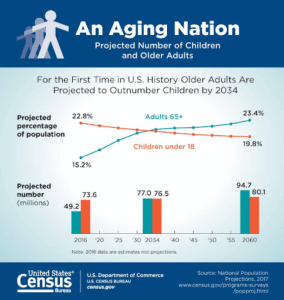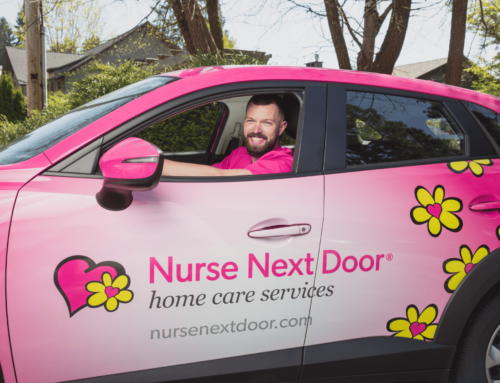The growing elderly population and the increasing need for quality home health care services present a fantastic opportunity for motivated entrepreneurs like you to make a significant difference in the lives of seniors in Texas. Nurse Next Door is committed to providing expert guidance and support to help you establish and grow your home health agency in this thriving market.
Whether you’re a healthcare professional seeking to start your own venture or a compassionate individual wanting to make a meaningful impact, this guide aims to equip you with the necessary resources and knowledge for success.
Embark on this exciting journey as we assist you in the startup process of building a business that genuinely enriches the lives of seniors and those in need of home and personal care in Texas.
Advantages of Starting a Home Health Care Business in Texas
Texas’s aging population, along with the rising demand for home health care services, presents a prime opportunity for entrepreneurs looking to start a home health agency. The Lone Star State offers various benefits, including a supportive regulatory environment, cost-effective healthcare expenses, and insurance coverage for home care services.
1) You Can Address the Rising Demand for Home Health Care Services:
According to the U.S. Census Bureau, the population of Texas residents aged 65 and older was approximately 3,676,724 in 2020, accounting for 12.6% of the state’s total population. This number is expected to grow significantly over the next decade, creating a high demand for home health care services.
By 2030, they predict that the population of residents aged 65 and older will increase by 4.8% then accounting for 17.4% of the state’s total population. This indicates the potential for job creation and business expansion in the home care industry in Texas ideal.
2) Texas Provides a Supportive Regulatory Environment for Home Care Agencies:
The Texas Health and Human Services Commission (HHSC) oversees home health agencies to guarantee patient safety and uphold high-quality standards. The state offers a clear licensing process, enabling home care entrepreneurs and other health-related business owners to navigate the regulatory landscape, obtain a Texas home care license, and operate their business with ease. The encouraging regulatory environment in Texas ensures that home health agencies can flourish while delivering exceptional care to clients.
3) Cost-Effective Healthcare Expenses and Revenue Generation Opportunities:
According to a study by the Health Care Cost Institute, Texas’s healthcare costs were 2.5% below the national average in 2019, making it more affordable for home care agency owners to manage their businesses while generating substantial revenue.
With the growing elderly population in Texas, the demand for home health care services is predicted to increase, providing abundant opportunities for entrepreneurs to establish thriving and purpose-driven home care businesses.
4) Comprehensive Insurance Coverage for Home Care Services:
Medicare, Medicaid, and private insurance plans in Texas cover home care services, offering a stable client base and source of income for entrepreneurs in the home health care industry. According to the Kaiser Family Foundation, as of 2019, 4,041,000 Texas residents were enrolled in Medicare, accounting for 14% of the state’s total population. Additionally, 4,533,400 residents were enrolled in Medicaid in Texas as of July 2020. These statistics demonstrate the potential for a reliable source of clients, business, and revenue for home health care entrepreneurs in Texas.
For more information on Texas’s medical programs and medicare certification for seniors, visit the Texas Health and Human Services website.
Crucial Steps to Establish a Successful Home Care Business
Here are the crucial steps we recommend for launching your home care business as smoothly as possible. Keep in mind, this list isn’t exhaustive, and some steps might occur in a different order or happen concurrently.
If any of these steps seem challenging, don’t worry! Reach out to a Nurse Next Door Franchise Development Manager, and they’ll be happy to help you explore how a franchise could be an excellent option for navigating the launch of your new home care start-up.
1) Create a Unique Selling Proposition (USP)
To differentiate your home care business from your competitors, it’s crucial to develop a Unique Selling Proposition (USP). Investigate your target market and competition to identify your USP. You might consider offering specialized medical services, such as disability services, nursing procedures, Alzheimer’s care or palliative care, or ensuring 24/7 availability.
Make sure your USP serves as the cornerstone of your branding and marketing efforts, allowing you to stand out and showcase what you uniquely provide, attracting potential clients seeking your specialized and valuable home care services.
At Nurse Next Door, our branding is one of our Unique Selling Propositions and is what get’s us seen!
2) Explore Financing Options for Your Home Care Business
Establishing a home care agency in Texas requires an significant investment, like any worthwhile business, but the rewards are more than promising. Various financing options are available for small business owners, including bank loans, Small Business Administration (SBA) loans, and crowdfunding.
Collaborating with a reputable franchise like Nurse Next Door can grant you access to financing alternatives and suitable lenders. However, it’s essential to carefully assess the costs associated with franchise ownership. Franchise ownership costs can vary considerably, and you need to determine which option aligns with your business objectives and budget. Investigate financing a franchise to learn more about the process.
3) Create an In-Depth Business Plan
Developing a comprehensive business plan is vital when starting a home care business in in the Lone State of Texas. Your business plan will enable you to outline your objectives and strategies, identify your target market, and devise a blueprint for your business’s growth. A well-structured business plan is invaluable when seeking financing from investors or lenders.
To create a thorough business plan, consider working with a certified home care consulting firm or partnering with a reputable franchise like Nurse Next Door. A franchise can provide you with a proven business model, comprehensive training, and ongoing support to help you succeed in the home care industry.
Your business plan should encompass:
- Your mission statement
- A description of your enterprise
- Your organizational structure and management team
- An analysis of your market and competition
- Your marketing and sales strategies
- Financial projections and budgeting
- Your plans for ongoing training and professional development
- Procedures and policies for compliance with Texas regulations and the Health and Human Services Commission
4) Apply to get your home care business license
Home and Community Support Services Agencies (HCSSAs) are required to hold a valid license to operate within Texas. To secure this license, you need to follow these steps:
-
Successfully complete the mandatory online pre-survey training.
-
Accurately fill out and submit the licensing application.
-
Provide and upload all necessary supporting documentation.
-
Submit payment for the associated licensing fees.
-
Ensure registration and good standing status with the Texas State Comptroller of Public Accounts.
-
Maintain active registration and good standing with the Texas Secretary of State.
-
Obtain approval from the Texas Health and Human Services Commission (HHS), specifically from the HCSSA Licensure and Certification Unit.
Visit here for more information.
Hire and Train Your Caregivers and Staff
The success of your Texas home care agency depends on the quality of your caregivers. Attracting skilled personnel and offering them comprehensive training is essential to provide top-quality home care services tailored to your clients’ needs.
To hire caregivers, consider partnering with local training institutions, posting on job boards, and utilizing your network. Ensure your hiring process includes background checks, interviews, and reference checks.
Develop a plan for ongoing training and professional development to guarantee your team remains up-to-date with the latest best practices, procedures, and technologies. Collaborating with a reputable franchise like Nurse Next Door can grant you access to an abundance of resources and expertise to help you build a highly skilled team of caregivers.
Check out our dedicated job board that promotes consistent hiring of caregivers and has proven to reduce turnover rates amounts our home care franchises.
Marketing your Home Care Business
Effectively promoting your home health services is essential for attracting new clients to your Texas home care agency. Implement these marketing strategies to reach a wider audience and grow your business:
- Develop a user-friendly website showcasing your services, pricing, and contact information.
- Utilize social media platforms like Facebook, Instagram, and LinkedIn to enhance your online presence and connect with potential clients. Share informative content, post engaging visuals, and respond promptly to inquiries and comments.
- Participate in healthcare industry conferences and seminars to stay updated on the latest trends and technologies and network with other industry professionals.
- Offer complimentary consultations to potential clients to establish trust and credibility. This can lead them to choose your business over competitors.
- Provide outstanding customer service to retain clients and encourage referrals. Train your staff to be empathetic, respectful, and attentive to clients’ needs.
- Set up a referral program for healthcare providers to form partnerships and generate referrals. Consider offering incentives such as service discounts or referral bonuses to motivate providers to recommend their patients to your business.
By implementing these marketing strategies, you can establish a thriving home care agency in Texas that provides exceptional care and services to clients. Emphasize your unique approach to home health care to attract and retain customers, and with dedication and commitment, you can positively impact the lives of seniors in your community.
Deciding Between an Independent Home Health Care Agency and Joining a Franchise in Texas
When starting a home health care business in Texas, you can either operate independently or join a franchise. Each option has its advantages and disadvantages, so it’s essential to choose the right path for your unique situation.
Advantages of Joining a Home Care Franchise in Texas
Joining a home care franchise in Texas offers numerous benefits for entrepreneurs interested in starting a home health care agency. Franchises often have a well-established brand and reputation, allowing you to capitalize on their success. Additionally, they usually offer comprehensive training and support, assisting you in various aspects, such as marketing and hiring. This can be particularly beneficial for those new to the industry or those who want the backing of an established organization.
Another significant advantage of joining a franchise is the potential to leverage the franchise’s economies of scale. This enables you to purchase supplies and equipment at lower costs, as the franchise likely has negotiated contracts with suppliers. This can help you save money and increase your profit margins.
Pros and Cons of Starting an Independent Home Health Care Business
Starting an independent home care business in Texas can give you more flexibility and autonomy, allowing you to create a business that aligns with your specific vision and values. It also means keeping all profits rather than paying franchise fees.
However, running an independent home health care agency also poses its challenges. You’ll need to build your brand and reputation without the support and resources of a larger organization. Additionally, you’ll be responsible for creating your marketing and training materials, which can be time-consuming and costly.
Ultimately, the choice between joining a franchise or starting an independent home health care agency depends on your unique situation and goals. Carefully weigh the pros and cons of each option before making a decision.
Set Up a Thriving Home Health Care Agency in Texas with Nurse Next Door
Taking the plunge into the home health care industry in Texas can prove to be not only a fulfilling endeavor but also a financially rewarding one, particularly in light of the escalating demand for these services. Texas, with its accommodating regulatory environment, reasonably priced healthcare facilities, and numerous opportunities for revenue generation, presents an advantageous landscape for home care agencies.
By faithfully following the detailed steps in this guide – which include securing the necessary licenses, defining your unique selling proposition, exploring viable financing options, and more – you are well-positioned to create a prosperous home care agency in Texas. With Nurse Next Door as your supportive partner, you gain access to proven business models, comprehensive training, and continual backing, empowering you to provide exceptional care that positively impacts your community.

 x
x









